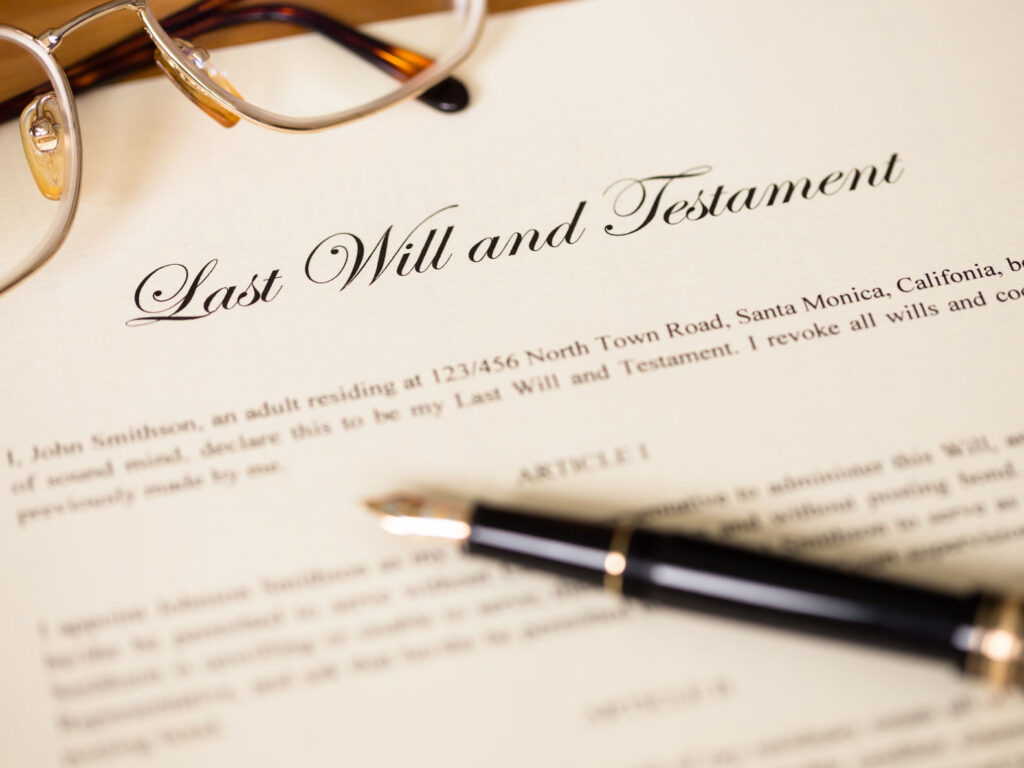Inheritance under wills according to Vietnam Law

Vietnam Law has regulations on inheritance under wills. Let’s find out this issue with Lawyer X through the following situation: “Dear Lawyer! I want to ask what does inheritance under wills mean in Vietnam? What are rights of heirs in inheritance under wills? Thanks for answering me!”
Legal grounds
2015 Vietnam Civil Code
Definition of wills in inheritance under wills
Will means an expression of the wishes of a natural person, made in order to bequeath his or her property to others after his or her death.
Who are testators?
– An adult satisfying conditions prescribed in Point a Clause 2 Article 630 of Vietnam Civil Code may make a will to dispose his/her property.
– A person who is between fifteen and eighteen years of age may make a will with the consent of his or her parents or guardian.
Rights of testators
A testator has the following rights:
– Appoint heirs or to deprive an heir of the right to inherit the estate;
– Determine those parts of the estate which each heir is entitled to;
– Reserve part of the estate as a gift or for worship purposes;
– Designate heirs to perform obligations;
– Appoint a custodian of the will, an administrator of the estate, and a distributor of the estate.
Formalities for wills
A will must be made in writing. If it is not able to be made in writing, it may be made orally.
Written wills comprise:
– Unwitnessed written wills;
– Witnessed written wills;
– Written wills which are notarized;
– Written wills which are certified.
Where a person is likely to die due to illness or any other reason and it is not possible for him or her to make a written will, such person may make an oral will. If the testator is alive and is of sound mind three months after he or she has made an oral will, such will shall automatically become invalid.
What are lawful wills?
– A will must satisfy the following requirements in order to be lawful:
+ The testator was of sound mind when he or she made the will; and he or she was not deceived, threatened or coerced into making the will;
+ The contents of the will are not contrary to law or social morals and the will complies with legal formalities.
– A will made by a person between fifteen and eighteen years of age must be made in writing and with the consent of the parents or guardian of such person.
– A will made by a person who is incapacitated or illiterate must be made in writing by a witness and must be notarized or certified.
– A written will which is not notarized or certified shall be deemed lawful only if it satisfies the requirements provided in Clause 1 of Article 630.
– An oral will shall be deemed lawful only if the testator orally expressed his or her last wishes before at least two witnesses who immediately thereafter recorded those wishes in writing and signed or fingerprinted the document. Such will must be notarized or certified within five working days of the date on which the testator orally expressed his or her last wishes.
Contents of written wills
– A will must specify clearly the following:
+ The date on which the will is made;
+ The full name and place of residence of the testator;
+ The full names of the persons and the bodies or organizations entitled to inherit the estate;
+ The estate to be bequeathed and its location.
– Apart from the contents prescribed in Clause 1 of Article 631, the will may have other contents.
– A will may not be written using abbreviations or other symbols. If a will consists of several pages, each page must be numbered and bear the signature or fingerprint of the testator.
Where a will has erasure or correction, the testator or the testament witness must sign beside erasing and corrected place.
Witnesses to making of will
Any person may act as a witness to the making of a will, except the following persons:
– Persons who are heirs of the testator under the will or at law;
– Persons with property rights or obligations which relate to the will;
– Minors, legally incapacitated persons, persons with limited cognition and behavior control.
Unwitnessed written wills
A testator must write a will by his or her own hand and must sign it.
The drawing up of a written will without witnesses must comply with article 631 of Vietnam Civil Code.
Witnessed written wills
Where a testator is not able to write a will by his or her own hand, the testator may request another person to write the will, but there must be at least two witnesses. The testator must sign or fingerprint the will in the presence of the witnesses; the witnesses shall acknowledge the signature or fingerprint of the testator and sign the will.
The will must be made in compliance with articles 631 and 632 of Vietnam Civil Code.
Wills which are notarized or certified
A testator may request that the will be notarized or certified.

Procedures for preparation of wills at notary office or people’s committee of commune
The preparation of a will at a notary office or the people’s committee of the commune must comply with the following procedures:
– The testator shall declare the contents of his or her will to a notary public officer or a member of the people’s committee of the commune who has the authority to certify it. The notary public officer or the person having the authority to certify must record the wishes stated by the testator. The testator shall sign or fingerprint the will after acknowledging that it has been recorded accurately and that it expresses faithfully the intentions of the testator. Thereafter, the notary public officer or the member of the people’s committee of the commune shall sign the will;
– Where the testator is not able to read or hear the will or not able to sign or fingerprint it, there must be a witness who must acknowledge the will by signing it before a notary public officer or a member of the people’s committee of the commune who has the authority to certify it. The notary public officer shall notarize the will, or the member of the people’s committee of the commune who has the authority to certify the will shall certify it, in the presence of the testator and the witnesses.
Persons not permitted to notarize or certify wills
A notary public officer or a member of the people’s committee of the commune who has authority shall not be permitted to notarize or certify a will if such person is:
– An heir of the testator under the will or at law;
– A person whose father, mother, wife, husband or child is an heir under the will or at law;
– A person having property rights or obligations relating to the will.
Written wills valid as though notarized or certified
– A written will made by a serving soldier who is not able to request a notarization or certification of his or her will provided that such will is certified by the head of his or her unit having the rank of a company commander or higher.
– A written will made by a person travelling on a seagoing vessel or aircraft provided that the will is certified by the captain of the vessel or aircraft.
– A written will made by a person undergoing medical treatment in a hospital or other medical establishment or sanatorium provided that the will is certified by the person in charge of such hospital or establishment or sanatorium.
– A written will made by a person conducting surveys, explorations or research in mountainous areas, forests or offshore islands provided that the will is certified by the person in charge of the unit.
– A written will made by a Vietnamese citizen residing abroad provided that the will is certified by a Vietnamese consular or diplomatic representative mission in that country.
– A written will made by a person held in temporary detention, serving a prison sentence or administrative penalty, or at an educational or medical facility provided that the will is certified by the person in charge of such facility.
Wills prepared by notary public officers at places of residence of testators
– A testator may request a notary public officer to visit his or her place of residence in order to prepare a will.
– Such will shall be prepared in accordance with the procedures for the preparation of wills at a State notary public provided in article 636 of Vietnam Civil Code.
Amendment of, addition to, replacement or revocation of wills
– A testator may amend, add to, replace or revoke his or her will at any time.
– If a testator adds to his or her will, the original will and the codicil shall have equal validity. If a part of the original will and the codicil conflict with each other, the codicil shall prevail.
– Where a testator replaces a will with a new will, the previous will shall be deemed to have been revoked.
Custody of wills
– A testator may request a notary office or another person to keep custody of the will of the testator.
– Where a will is kept in custody by a notary office, it must be taken care of and looked after in accordance with the law on notaries.
– An individual keeping custody of a will has the following obligations:
+ Keep the contents of the will confidential;
+ Take care of and look after the will. If the will is lost or damaged, the person must notify immediately the testator;
+ Upon the death of the testator, to deliver the will to his or her heirs or to the person authorized to announce the will. The delivery of the will must be recorded in writing and signed by the person delivering the will, and by the person receiving it, in the presence of two witnesses.
Loss and damage of wills
– If, from the commencement of the inheritance, the will is lost or damaged to the extent that it is incapable of indicating clearly the wishes of the testator and there is no evidence of the true wishes of the testator, it shall be deemed that no will exists and inheritance at law shall apply.
– Where the will is found prior to distribution of the estate, the estate shall be distributed according to the will.
– Within the prescriptive periods for requesting estate distribution, if a will is found after the distribution of the estate, the estate shall be distributed according to the will at the request of the heir under will.
Legal effectiveness of wills
– A will shall become legally effective from the time of commencement of the inheritance.
– All or part of a will shall be legally ineffective in any of the following cases:
+ An heir under the will dies prior to or at the same time as the testator dying;
+ A body or organization named as an heir no longer exists at the time of commencement of the inheritance.
Where there are several heirs under a will and one of them dies prior to or at the same time as the death of the testator or one of the bodies or organizations named as an heir under the will no longer exists at the time of commencement of the inheritance, only that part of the will which relates to the individual, body or organization no longer existing shall be legally ineffective.
– A will shall not be legally effective if the estate left to the heirs no longer exists at the time of commencement of the inheritance. If only part of the estate left to the heirs remains, only that part of the will which relates to such part of the estate shall be legally effective.
– Where a will contains provisions which are unlawful but such provisions do not affect the effectiveness of the remainder of the will, only such provisions shall be legally ineffective.
– Where a person leaves behind more than one will with respect to certain property, only the most recent of such wills shall be legally effective.
Heirs notwithstanding contents of wills
– Where a testator does not grant any of the following persons an inheritance, or grants any such person an inheritance which is less than two-thirds of the share that person would have received if the estate had been distributed according to law, such person shall be entitled to a share of the estate equivalent to two-thirds of the share that he or she would have received if the estate had been distributed in accordance with law:
+ Children who are minors, father, mother, wife or husband of the testator;
+ Children who are adults but who are incapable of working.
– Clause 1 of Article 644 shall not apply to persons who have disclaimed their inheritance as prescribed in Article 620 or person who are not entitled to inherit as prescribed in Clause 1 Article 621 of Vietnam Civil Code.
Estates used for worship purposes
– Where a testator designates part of his or her estate for worship purposes, such part of the estate shall not be distributed among the heirs and shall be delivered to the person appointed in the will to manage for worship purposes. If such appointee fails to implement strictly the will or the agreement of the heirs, the heirs have the right to appoint another person to manage for worship purposes.
Where the testator fails to appoint a person to manage that part of his or her estate which is designated for worship purposes, the heirs shall appoint a person to manage such part of the estate.
Where all heirs under a will have died, that part of the estate which is designated for worship purposes shall belong to the person managing that part of the estate for worship purposes provided that he or she is an heir at law.
– Where the entire estate of the deceased is insufficient to satisfy all property obligations of the deceased, no part of the estate may be designated for worship purposes.
Regulations on testamentary gifts
– A testator may designate part of his or her estate as a testamentary gift to another person. The testamentary gift must be expressly stated in the will.
– The grantee of the testamentary gift must be alive at the time of commencement of the inheritance or he/she must bear and alive after the time of commencement of the inheritance he/she must be conceived before the death of the estate leaver. If the grantee of the testamentary gift is not a natural person, it must exist at the time of commencement of the inheritance.
– The grantee of a gift shall not be required to fulfill property obligations with respect to that part of the estate granted as a gift, unless the whole estate is insufficient to satisfy all property obligations of the grantor, in which case the part of the estate granted as a gift shall also be applied towards satisfying the remainder of the obligations of the grantor.
Announcement of wills
– Where a written will is kept by a notary office, the notary officer shall be the person announcing the will.
– Where a testator has appointed a person to announce the will, such person shall announce the will. If the testator fails to appoint a person or has appointed a person but the appointee refuses to announce the will, the heirs shall agree on the appointment of a person to announce the will.
– After the time of commencement of an inheritance, the person announcing the will must send copies of the will to all persons with an interest in the contents of the will.
– A recipient of a copy of a will has the right to verify the copy against the original.
– Where a will has been prepared in a foreign language, it must be translated into Vietnamese and notarized.
Interpretation of contents of wills
Where the contents of a will are unclear and may be interpreted in different ways, the person announcing the will and the heirs must interpret jointly the contents of the will based on the true wishes of the deceased, taking into consideration the relationship of the deceased with the heirs under the will. If such persons fail to agree on the interpretation of the contents of the will, they have the right to request a court for settlement.
Where part of the contents of a will is not able to be interpreted but the remainder of the will is not affected, only that part which is not able to be interpreted shall not be legally effective.
Please see more:
- Instructions for exclusive registration of company logos in Vietnam
- Service of changing the legal representative of Vietnamese enterprises
Services of Lawyer X
Prestigious professional services: Firstly, the team of consultants and consultants for many years in the field of civil status, and customer support.
On-time: Certainly, with the motto “Get your lawyer right at your fingertips”, we ensure the service always performs on time. The rights and interests of customers always come first.
Cost: Besides, Lawyer X’s service costs are highly competitive; depending on the nature of the particular case. So, we want our guests to have the best possible service experience. Therefore, costs which guaranteed to be the most suitable and economical for customers.
Confidentiality of client information: Finally, all personal information of clients Lawyer X will be 100% confidential.
If you need any further information, please contact LSX Law firm: at +84846175333 or Email: [email protected]
Frequently asked questions
Will means an expression of the wishes of a natural person, made in order to bequeath his or her property to others after his or her death.
A person who is between fifteen and eighteen years of age may make a will with the consent of his or her parents or guardian.
Yes! A testator has the right to appoint heirs or to deprive an heir of the right to inherit the estate.
Conclusion: So the above is Inheritance under wills according to Vietnam Law. Hopefully with this article can help you in life, please always follow and read our good articles on the website: lsxlawfirm.com




